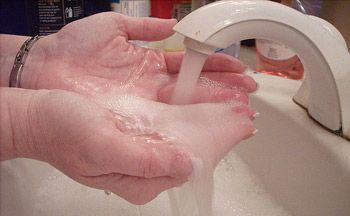OCD Awareness Lacking in UK, As Half Of Population Believes They Have Some Form Of The Disorder

You may have heard someone, or even yourself, say that you are “a little bit OCD;” whether you’re worried about double-checking locks, washing your hands twice, or having a very rigid routine to keep things in order. A new study conducted in the U.K. shows that almost half of the U.K. population believes they have mild obsessive compulsive disorder, OCD, symptoms, pointing to a general lack of understanding and awareness about the mental illness.
The numbers aren't even close. In the U.K., officials estimate that only 1.2 percent of the population actually has the mental illness, while the survey completed by Benenden Health and OCD U.K. revealed that 40 percent of participants believed they had some form of the disorder. About one percent of the American population has OCD, according to the National Institute of Mental Health.
Obsessive compulsive disorder involves checking things, washing hands, or performing rituals or routines repeatedly, which cause anxiety, distress, and get in the way of daily life. People struggling with OCD have obsessive thoughts, such as the fear that everything they touch may be contaminated with germs; or if a task isn’t completed in the “proper” way, they will be punished or something bad will happen. They feel the need to repeat their ritual (washing hands, counting to a certain number, retracing their steps, arranging items a certain way) in order to fight these obsessions.
“Performing such rituals is not pleasurable,” the National Institute of Mental Health writes on its website. “At best, it produces temporary relief from the anxiety created by obsessive thoughts.” The NIMH lists several signs that a person may be struggling with OCD, including having repeated thoughts about germs, dirt, intruders, acts of violence, hurting loved ones, sexual acts, or conflicts with religious beliefs. These people cannot control the rituals — or compulsions — they perform, and overall cannot control their behavior or the anxiety it produces.
The study was published at the beginning of International Obsessive Compulsive Disorder Week, which lasts October 14-20, 2013. The International OCD Foundation hopes to raise awareness about the disorder. After all, as the Foundation notes on its website, it can take up to 14-17 years after the initial onset of OCD symptoms for people to access proper therapy and treatment, “due to obstacles such as stigma and a lack of awareness about mental health.”
"OCD can have a huge impact on the daily life of so many people across the UK — at all ends of the spectrum,” Paul Keenan, Head of Communications at Benenden Health, said in a news release about the study. “In our survey over 40 percent of people said they believe they suffer from some traits of the condition — but it's important that where this starts to have a serious impact on their life people seek help and go to their doctor to get a diagnosis.”
Researchers found that nearly one in 20 people will check their door locks more than once, and the same number worry that if a task isn’t done just right, something horrible will happen to them or to their loved ones. But that doesn't mean they have a clinical condition like OCD, and some experts worry that mixing up mild behaviors with serious health issues can be detrimental to public health.
"The term 'I'm a little bit OCD' is frequently used in everyday language, but what people don't realise is that the illness actually can have a devastating impact on those that suffer, sometimes with sad and tragic consequences,” Ashley Fulwood, the CEO of OCD UK, said in the news release. Though many average people may experience behavior that they think is similar to OCD symptoms, severe cases of the disorder are, by definition, obstacles to the person living a normal life, often not even allowing them to step outside their door.
Though it’s not certain what causes OCD, the disorder may be linked to upbringing, anxiety, environment, religion, or other mental illnesses. Treatment for OCD involves medication such as anti-depressants, as well as Exposure and Response Prevention (ERP) therapy, which helps the patient to face their fears and stop the compulsive behavior.



























